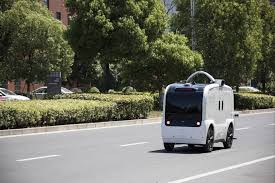The U.S. Commerce Department announced on Monday that it is attempting to prohibit the sale of linked and autonomous cars that have hardware and software from China and Russia to safeguard American drivers and national security.
Although the United States has very little Chinese and Russian software installed, the hardware problem is more complex.
The bans on software and hardware, according to Commerce authorities, will therefore go into force for the 2027 model year and, for units without a model year, for the 2030 model year, respectively.
The agency described the measure unveiled on Monday as proactive but crucial, considering that all the gadgets in cars, such as cameras, GPS tracking, microphones, and Bluetooth, could leave Americans open to abuse by criminals and possibly expose personal information, such as drivers’ home addresses and children’s schools.
In dire circumstances, U.S. Secretary of Commerce Gina Raimondo warned reporters in a call on Sunday that a foreign opponent might shut down or seize simultaneous control of several vehicles operating in the country, resulting in collisions and obstructing traffic.
Raimondo declared, “This is not about trade or economic advantage.” “This is purely a national security measure. The good news is that there aren’t many Chinese or Russian vehicles on the road at the moment.
However, Raimondo stated that the United States should take a lesson from Europe and other parts of the world where Chinese automobiles have fast become the norm.
Due to China’s rapid market share growth, security worries regarding the substantial software-driven functions of Chinese automobiles have surfaced in Europe.
“The question of who is in charge of these data flows and software updates is far from insignificant; the answers to it touch on issues of cybersecurity, national security, and personal privacy,” stated Janka Oertel, the director of the European Council on Foreign Relations Asia program, on the organization’s website.
Today’s cars are “mobility platforms” that track their environment and keep an eye on the actions of the driver and passengers.
The terms of the service contracts that come with the equipment make it obvious that vehicle data ends up in China.
According to Raimondo, the United States won’t wait until Chinese or Russian automobiles predominate on its highways.
“We are releasing a proposed regulation to tackle these novel national security risks before vendors, automakers, and automobile parts associated with China or Russia become customary and pervasive in the American automotive industry,” stated Raimondo.
A senior administration official stated that it is hard to predict when China would reach that point of saturation.
However, the Commerce Department stated that China intends to join the American market, and several Chinese companies have already declared their intentions to enter the automotive software industry.
Russia was included in the regulations by the Commerce Department because, according to senior administration officials on the call, the nation is attempting to “breathe new life into its auto industry.”
The proposed rule would forbid the sale and import of automobiles equipped with hardware and software made in China and Russia that would enable the car to connect to the outside world via Bluetooth, cellular, satellite, or Wi-Fi modules.
Additionally, it would be illegal to import or sell software parts produced in China or Russia that together enable a highly autonomous car to run without a human driver.
Automobiles built in the United States with Russian and Chinese technology would be prohibited.
All vehicles would be covered by the proposed law, except those employed for mining or agriculture that are not driven on public highways.
Laptops 1000Top administration officials said that during the drafting of the new rule to better understand supply chain networks, Commerce officials met with representatives from all of the major automakers in the globe as well as other industry associations.
Before the rule is finalized, the Commerce Department solicits public opinions, which must be submitted within 30 days of the regulation’s publication. By the end of the Biden administration, that ought to have occurred.
The new regulation expands on efforts to lessen American reliance on Beijing and support domestic manufacturing. It comes after the Biden administration took action earlier this month to crack down on low-cost goods supplied out of China, including electric automobiles.

















